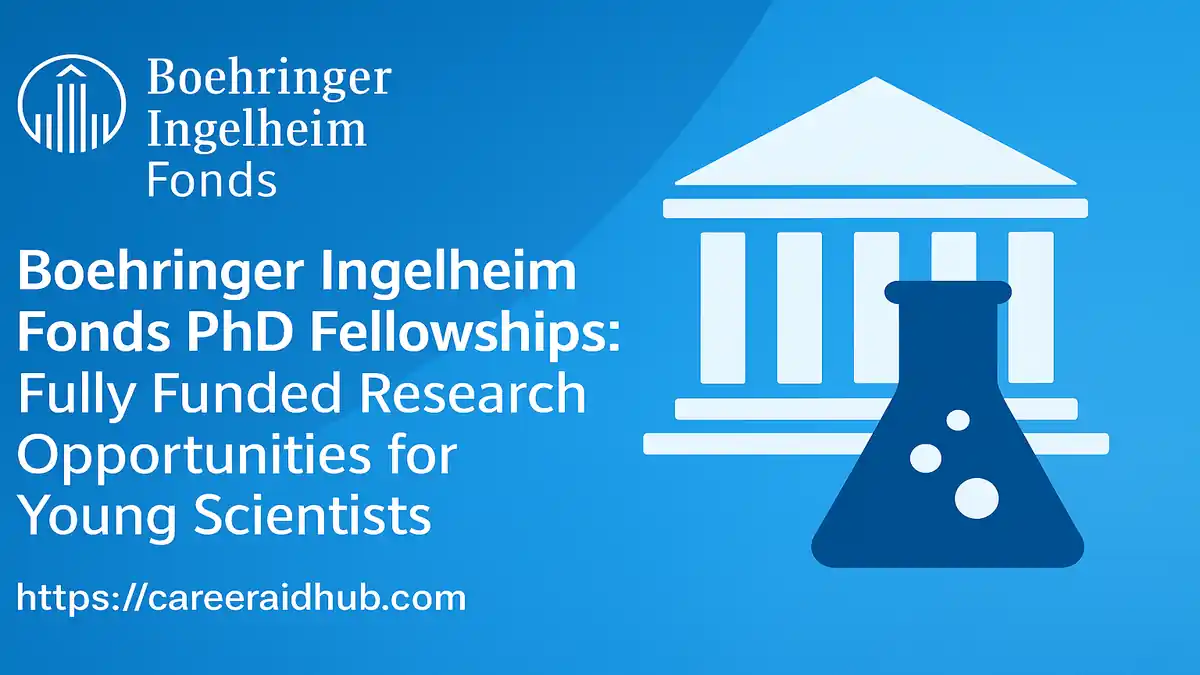For doctoral students eager to elevate their academic pursuits, the Chateaubriand Fellowship emerges as a golden opportunity. Sponsored by the Embassy of France in the United States, this prestigious program bridges American and French research communities, fostering collaboration and innovation. Whether you’re immersed in STEM disciplines or passionate about humanities and social sciences, this fellowship invites you to conduct transformative research in France.
In this detailed guide, we’ll uncover the Chateaubriand Fellowship’s structure, eligibility, benefits, and application process, empowering you with everything needed to seize this academic adventure.
What Defines the Chateaubriand Fellowship Program?
The Chateaubriand Fellowship is a competitive, merit-based grant tailored for exceptional PhD students from U.S. universities. Established in 1981 by the Embassy of France, it seeks to deepen academic connections between the two nations through collaborative research. Today, it thrives as a vital pillar of Franco-American scholarly exchange, offering two specialized tracks:
- STEM Track: Focused on Science, Technology, Engineering, Mathematics, and Biology-Health.
- HSS Track: Dedicated to Humanities and Social Sciences.
As of March 2025, the program remains active, with the 2025-2026 application cycle set to launch in October 2025. Over the
Program Duration and Study Format
The Chateaubriand Fellowship provides a flexible research window of 4 to 9 months. Specifically, STEM fellows enjoy a range of 4 to 9 months, while HSS fellows can stay for 4 to 8 months. This duration allows ample time to dive into complex projects and forge meaningful connections with French researchers.
Study Format
The program demands a full-time, in-person commitment. Fellows relocate to France, working directly within host laboratories or institutions. Consequently, no part-time, online, or hybrid options exist, underscoring the fellowship’s focus on immersive, hands-on collaboration.
Key Focus Areas of the Chateaubriand Fellowship
The fellowship embraces a broad spectrum of disciplines, organized into two dynamic streams:
STEM Disciplines: Pioneering Scientific Innovation
The STEM track, backed by the French Embassy’s Office for Science & Technology (OST), targets doctoral students in science, technology, engineering, mathematics, and health-related fields. Partnering with renowned entities like Inserm, Inria, and the National Science Foundation’s GROW program, it supports cutting-edge research in areas such as biotechnology, computational science, and environmental engineering. Thus, it’s an ideal platform for those aiming to push scientific boundaries through international teamwork.
HSS Disciplines: Exploring Humanities and Social Sciences
Conversely, the HSS track, managed by the Cultural Services of the
Together, these focus areas make the fellowship a versatile springboard for academic excellence, appealing to a wide range of doctoral candidates.
Current Status: Is the Program Still Active?
The Chateaubriand Fellowship continues to flourish, accepting applications annually with no indication of discontinuation. For the 2026-2027 cycle, expect the application portal to open in October 2025, with fellowships starting between September 2026 and April 2027. Therefore, aspiring researchers should monitor the official website for the latest updates and deadlines.
Who Qualifies? Eligibility Criteria Explained
To secure this fellowship, candidates must meet specific standards:
- Academic Status: Must be a doctoral student enrolled at a U.S. university.
- Nationality: Open to students of all nationalities, except French citizens.
- Research Alignment: Your research must align with either the STEM or HSS tracks.
- Host Institution Agreement: Secure co-supervision from both your U.S. advisor and a French host institution.
- Language Proficiency: French language skills aren’t mandatory, as requirements vary by host.
Benefits: What Does the Fellowship Offer?
The Chateaubriand Fellowship delivers a robust package to fuel your research journey. Notably, fellows receive:
- Monthly Stipend: Up to €1,750 (around $1,900 USD in March 2025), adjusted based on additional funding.
- Travel Allowance: Round-trip airfare to France.
- Health Insurance: Full coverage throughout your stay.
Beyond financial perks, the program offers access to elite French labs, networking with top scholars, and immersion in a vibrant academic culture. As a result, fellows often gain sharpened skills, broader networks, and a standout edge in their careers.
How to Apply: Step-by-Step Application Process
Applying requires careful planning, as the window typically runs from October to January for the following year’s fellowships. Here’s how to navigate the process:
Step 1: Craft a Winning Research Proposal
Develop a concise, 3-page proposal detailing your U.S.-based research and its expansion in France. Highlight the collaborative potential with your French host to strengthen your case.
Step 2: Gather Support Letters
Secure a letter from your U.S. advisor endorsing your plan, plus an invitation from your French host. HSS applicants also need a second recommendation from a familiar professor.
Step 3: Compile Essential Documents
Submit transcripts, a degree list, and, if applicable, a co-tutelle agreement for
Step 4: Submit Online
Upload everything via www.chateaubriand-fellowship.org before the deadline. Late submissions aren’t considered, so timing is critical.
Since the merit-based selection involves experts from both nations, your application must shine with clarity and originality.
Tips to Ace Your Chateaubriand Fellowship Application
Boost your odds with these proven strategies:
- Align Your Research: Tailor your proposal to the program’s collaborative mission—show how it benefits both countries.
- Choose the Right Host: Select a French host with expertise matching your project, enhancing credibility.
- Start Early: Begin preparing your materials well in advance to secure strong endorsements and refine your application.
- Seek Feedback: Share your proposal with mentors or colleagues for constructive feedback.
- Follow Guidelines: Adhere strictly to the application requirements to avoid disqualification.
The Fellowship’s Lasting Impact and Legacy
Since 1981, the Chateaubriand Fellowship has shaped academic collaboration, supporting 40-50 STEM and 15-20 HSS fellows annually, totaling over 850 alumni. These scholars have driven progress in fields like cancer research and cultural studies, often co-authoring papers with French peers. Furthermore, partnerships with institutions such as Inserm, Inria, and the University of Paris-Saclay highlight its prestige.
For instance, alumni frequently cite the program’s role in expanding their horizons and building enduring connections. Thus, it not only advances individual careers but also enriches the global research landscape.
Why Pursue the Chateaubriand Fellowship?
For PhD students craving growth, this fellowship offers unmatched rewards. Beyond funding, it immerses you in France’s academic heritage, bolsters your resume with global experience, and links you to a scholarly network. Whether tackling scientific challenges or humanistic questions, it equips you to leave a lasting mark.
Conclusion: Embark on Your Research Journey
In essence, the Chateaubriand Fellowship is a game-changer for doctoral students eyeing research in France. With its STEM and HSS tracks, 4- to 9-month flexibility, and robust support, it seamlessly connects American and French academia. As it thrives in 2025, the time is ripe to act.
Quick Reference Table
Field | Details |
Name of Program | Chateaubriand Fellowship |
Organization Name | Embassy of France in the United States |
Location | France |
Eligibility | PhD students at U.S. universities (non-French citizens) |
Focus Areas | STEM (Science, Tech, Engineering, Math, Health); HSS (Humanities, Social Sciences) |
Application Deadline | Typically January (e.g., January 2026 for 2026-2027 cycle) |
Official Link |
Chateaubriand Fellowship FAQ
A prestigious grant by the French Embassy for U.S. PhD students to research in France.
PhD students at U.S. universities (non-French citizens) in STEM or HSS fields.
STEM (science, tech, engineering, math, health) and HSS (humanities, social sciences).
It lasts 4-9 months, depending on your research track (STEM or HSS).
Yes, it’s active; applications for 2025-2026 open in October 2025.
Typically January (e.g., January 2026 for the 2026-2027 cycle).
No, French isn’t required; it depends on your host institution.
Monthly stipend (€1,750), travel support, and health insurance included.
Submit a research proposal, letters, and docs online by January.
In France, at a host lab or institution, full-time.
No, French nationals are ineligible to apply.
Up to €1,750 monthly (~$1,900 USD in 2025), adjustable.
Between September 2026 and April 2027 for the next cycle.
Full-time only, requiring in-person research in France.
Visit www.chateaubriand-fellowship.org for details and forms.










